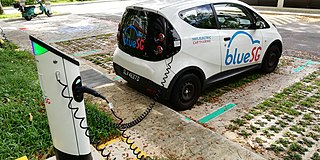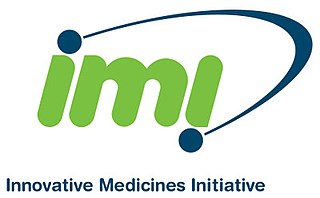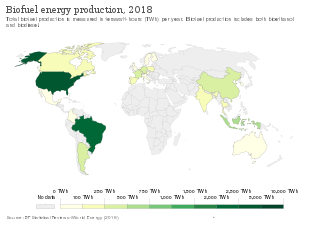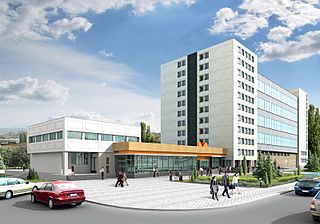
The European Research Area (ERA) is a system of scientific research programs integrating the scientific resources of the European Union (EU). Since its inception in 2000, the structure has been concentrated on European cooperation in the fields of medical, environmental, industrial, and socioeconomic research. The ERA can be likened to a research and innovation equivalent of the European "common market" for goods and services. Its purpose is to increase the competitiveness of European research institutions by bringing them together and encouraging a more inclusive way of work, similar to what already exists among institutions in North America and Japan. Increased mobility of knowledge workers and deepened multilateral cooperation among research institutions among the member states of the European Union are central goals of the ERA.
The Framework Programmes for Research and Technological Development, also called Framework Programmes or abbreviated FP1 to FP9, are funding programmes created by the European Union/European Commission to support and foster research in the European Research Area (ERA). Starting in 2014, the funding programmes were named Horizon.

Clean technology, in short cleantech, is any process, product, or service that reduces negative environmental impacts through significant energy efficiency improvements, the sustainable use of resources, or environmental protection activities. Clean technology includes a broad range of technology related to recycling, renewable energy, information technology, green transportation, electric motors, green chemistry, lighting, grey water, and more. Environmental finance is a method by which new clean technology projects can obtain financing through the generation of carbon credits. A project that is developed with concern for climate change mitigation is also known as a carbon project.

Although the European Union has legislated in the area of energy policy for many years, the concept of introducing a mandatory and comprehensive European Union energy policy was only approved at the meeting of the informal European Council on 27 October 2005 at Hampton Court. The EU Treaty of Lisbon of 2007 legally includes solidarity in matters of energy supply and changes to the energy policy within the EU. Prior to the Treaty of Lisbon, EU energy legislation has been based on the EU authority in the area of the common market and environment. However, in practice many policy competencies in relation to energy remain at national member state level, and progress in policy at European level requires voluntary cooperation by members states.
The Ghent Bio-Energy Valley is a joint initiative, started in 2005, of Ghent University, the city of Ghent, the Port of Ghent, the Development Agency East Flanders and a number of industrial companies. The initiative aims at the development of biofuels and bio-enzymes. It is an initiative of Professor Wim Soetaert of the university and aiming towards a bio-based economy.

The Innovative Medicines Initiative (IMI) is a European initiative to improve the competitive situation of the European Union in the field of pharmaceutical research. The IMI is a joint initiative of the DG Research of the European Commission, representing the European Communities, and the European Federation of Pharmaceutical Industries and Associations (EFPIA). IMI is laid out as a Joint Technology Initiative within the Seventh Framework Programme. Michel Goldman was the first executive director, from September 2009 until December 2014.
The European Construction Technology Platform (ETCP) is a European Seventh Framework Programme initiative to improve the competitive situation of the European Union in the field of construction.
The European Rail Research Advisory Council (ERRAC) is a European Seventh Framework Programme initiative to improve the competitive situation of the European Union to revitalise the European rail sector.
The European Space Technology Platform (ESTP) is a European Seventh Framework Programme initiative to improve the competitive situation of the European Union in the field of space technology. It continues to work during Horizon 2020 (2014–2020).
The European Steel Technology Platform (ESTEP) is a European Seventh Framework Programme initiative to improve the competitive situation of the European Union in the field of steel technology. The main objective of the programme is to produce a Strategic Research Agenda (SRA).
The European Technology Platform for Wind Energy (TPWind) is a European Seventh Framework Programme initiative to improve the competitive situation of the European Union in the field of wind energy.
The European Technology Platform for Sustainable Chemistry (SusChem) is a European Technology Platform (ETP) initiative to improve the competitive situation of the European Union in the field of chemistry in three domains: Industrial Biotechnology, Materials Technology, and Reaction and Process Design.

An aviation biofuel or bio-jet-fuel or bio-aviation fuel (BAF) is a biofuel used to power aircraft and is said to be a sustainable aviation fuel (SAF). The International Air Transport Association (IATA) considers it to be one of the key elements to reduce the carbon footprint within the environmental impact of aviation. Aviation biofuel could help decarbonize medium- and long-haul air travel generating most emissions, and could extend the life of older aircraft types by lowering their carbon footprint.
This page is an index of sustainability articles.

The use of biofuels varies by region. The world leaders in biofuel development and use are Brazil, United States, France, Sweden and Germany.

The Singapore Institute of Technology is the fifth autonomous university in Singapore. Established in May 2009, SIT is Singapore's first university of applied learning.

Global Clean Energy Holdings (OTC:GCEH) is a Southern California-based renewable energy company focused on the production and commercialization of non-food based feedstocks used for the production of biofuels, biomass and renewable chemicals.
The Minister of Transport and Communications is one of the Finnish Government's ministerial positions. The Minister of Transport and Communications heads the Ministry of Transport and Communications.

TP Vision is a wholly owned subsidiary of TPV Technology, based in Amsterdam, the Netherlands, which develops, manufactures and markets Philips branded TV sets in Europe, Russia, the Middle East, Brazil, Argentina, Uruguay, Paraguay, Mexico, Perú, Chile and selected countries in Asia-Pacific and they serves both consumer and hospitality markets.

The European Polytechnical University, or EPU, is a private engineering university, located in Pernik, Bulgaria. The university was founded in 2010.









